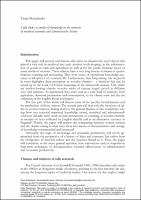Chapter Tally sticks as media of knowledge in the contexts of medieval economic and administrative histor
Abstract
Tally sticks worked as ubiquitous stores of numerical knowledge and tools of accounting and administration in medieval Europe. Previous research emphasized both the potential and value of the wooden notched sticks not only for the social and economic history of the Middle Ages, but also for the history of writing, intellectual history. This article combines the analysis of archival objects and written sources from England and Germany analysing their various contexts of use. These involve the centralised, highly professional and ritualised tax accounting at the English Exchequer, husbandry and agriculture, consumer taxation as well as public credit and circulating money-substitutes. Furthermore tallies were often used as evidence in court and functioned alongside written administration.
Keywords
tally sticks; book-keeping; material culture; numerical knowledgeDOI
10.36253/979-12-215-0092-9.09ISBN
9791221500929, 9791221500929Publisher
Firenze University PressPublisher website
https://www.fupress.com/Publication date and place
Florence, 2023Series
Datini Studies in Economic History, 3Classification
Sociology


 Download
Download Web Shop
Web Shop